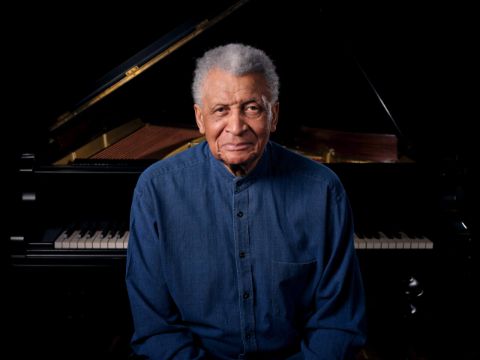Abdullah Ibrahim ‚3‘ Trio
Concert
Sa., 7.9.2024
20:00
Miriam Makeba Auditorium
€24/20

Abdullah Ibrahim. Photo: Peter Rauch
At age 90, Abdullah Ibrahim continues to create a sound that deeply resonates with our times, leaving an indelible mark on the world through his musical and political influence. His innovations have paved the way for generations of musicians, while his powerful political voice has championed important agendas, empowered communities, and expanded horizons—an impact that remains profoundly significant to this day.
The journey of the South African legend born as Adolph Johannes Brand began in Cape Town, where his grandmother, a pianist for the local African Methodist Episcopal church, and his mother, who directed the choir, were his first musical influences. His early musical experiences were diverse, spanning Khoisan songs, marabi dance music, and US jazz on 78 rpm records featuring artists like Louis Armstrong and Duke Ellington. Fascinated by imported US records, Ibrahim was nicknamed ‘Dollar’. In fact, his early albums appeared under the name ‘Dollar Brand’ until he changed his name after converting to Islam at the end of the 1960s. Growing up amidst this vibrant cultural melting pot, young Abdullah Ibrahim emerged as a pioneering figure in blending bebop with a unique Cape Town sensibility, culminating in the establishment of the Dollar Brand Trio in 1958. In 1959 Ibrahim released the only album with The Jazz Epistles, featuring saxophonist Kippie Moeketsi, trumpeter Hugh Masekela, trombonist Jonas Gwangwa, bassist Johnny Gertze, and drummer Makaya Ntshoko—the first album released by a Black South-African band that became a cultural manifesto during the anti-apartheid struggle of the time.
The Sharpeville massacre in March 1960 marked a turning point moment with jazz becoming a powerful symbol of resistance. In response, the government shuttered clubs and targeted musicians, significantly hindering the music scene in South Africa. Faced with these challenges, Ibrahim relocated to Zurich and later moved to New York in 1965. During this period, contemporaries such as Hugh Masekela and Miriam Makeba were also establishing successful careers in the United States. In the late 1960s, Abdullah Ibrahim returned to South Africa, making frequent visits home. It was during these visits that he produced some of his most revered works, including Mannenberg—Is Where It’s Happening, in 1974.The title track ‘Mannenberg’ became an unofficial anthem for the African National Congress (ANC).
Following his exile after the Soweto uprising in 1976, Ibrahim released acclaimed albums such as Africa—Tears and Laughter, African Dawn, and Water from an Ancient Well. Upon Nelson Mandela's release in 1990, Ibrahim returned to South Africa, continuing to create influential music. For several years, he has been based in the south of Germany. While he embarks on a series of concerts across Europe to celebrate his 90th birthday, the audience at HKW is reminded to cherish this living legend. For this performance, he will be accompanied by Cleave Guyton on saxophone and Noah Jackson on bass and cello, showcasing his enduring musical brilliance.